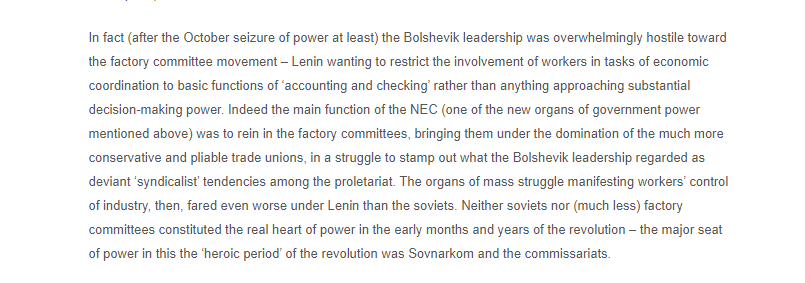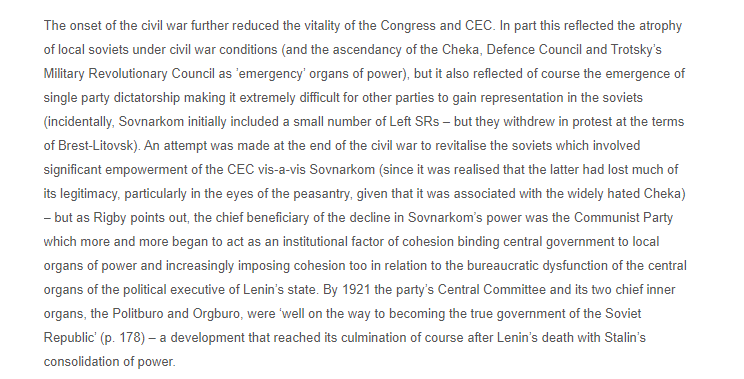lenin& #39;s legacy is a complicated one and it& #39;s worth grappling with the full complexity. the russian revolution is one of the most important communist achievements in history. the bolsheviks also utterly failed to "smash the [old] state" as lenin called for in his writing.
quotes are from "The Bolsheviks did not ‘smash’ the old state" by ed rooksby: https://edrooksby.wordpress.com/2019/04/10/the-bolsheviks-did-not-smash-the-old-state/
if">https://edrooksby.wordpress.com/2019/04/1... lenin had followed through on his own advocacy in "State & Revolution", the USSR would have looked quite different. of course, they were also fighting a war. no easy answers.
if">https://edrooksby.wordpress.com/2019/04/1... lenin had followed through on his own advocacy in "State & Revolution", the USSR would have looked quite different. of course, they were also fighting a war. no easy answers.
an operative quote above: "Several of the old institutions of the old imperial state were, of course, destroyed...But, as Rigby puts it, when ‘it came to the apparatus of the executive arm of the government, however, destruction was far less apparent’."
on the disempowering of the worker soviets and empowering of the executive arm (sovnarkom and the commissariats, many of whom were directly imported from the tsarist compromise government) under the bolsheviks
we do a disservice to the full legacy of the communist and workers& #39; movements throughout history by failing to grapple critically with it. for those who stand by lenin& #39;s "State and Revolution": lenin himself was a poor implementer of it. we must analyze these failures, do better.
to my many mutuals out there posting about reading State and Revolution, i think we have a responsibility to read not just theory, but the history of how it was (or wasn& #39;t) implemented in practice. it is not enough to know what lenin advocated, but also what he did, and why.
i, for one, think State and Revolution is an intensely valuable text, and while some of the criticisms of it i& #39;m already getting in the replies (for example: *can* it effectively be implemented? not much evidence to "yes") are valid, i think grappling with it as both theory and
practice (in history) is intensely valuable, and i think doing one without the other really limits the actual usefulness of engaging with state and rev.

 Read on Twitter
Read on Twitter![lenin& #39;s legacy is a complicated one and it& #39;s worth grappling with the full complexity. the russian revolution is one of the most important communist achievements in history. the bolsheviks also utterly failed to "smash the [old] state" as lenin called for in his writing. lenin& #39;s legacy is a complicated one and it& #39;s worth grappling with the full complexity. the russian revolution is one of the most important communist achievements in history. the bolsheviks also utterly failed to "smash the [old] state" as lenin called for in his writing.](https://pbs.twimg.com/media/EWTJP4LX0AEWzrT.png)
![lenin& #39;s legacy is a complicated one and it& #39;s worth grappling with the full complexity. the russian revolution is one of the most important communist achievements in history. the bolsheviks also utterly failed to "smash the [old] state" as lenin called for in his writing. lenin& #39;s legacy is a complicated one and it& #39;s worth grappling with the full complexity. the russian revolution is one of the most important communist achievements in history. the bolsheviks also utterly failed to "smash the [old] state" as lenin called for in his writing.](https://pbs.twimg.com/media/EWTJQSkWoAIZ7Ag.png)




